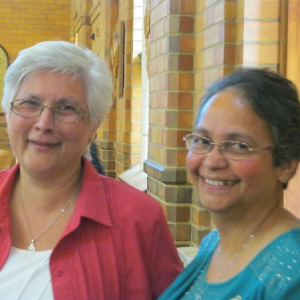Peter MALONE
News from the ‘Grey Sister’, the Family Care Sisters. Memories for many of Croydon.
News from the ‘Grey Sister’, the Family Care Sisters. Memories for many of Croydon.

MSC who lived and studied at Croydon will remember Kewn Kreestha in Alto Ave, Croydon, and the ‘Grey Sisters’ and their work there for mothers. Those visited or studied at Heart of Life at Canterbury, will remember that we rented their old convent building from 1986-2003.
Here is a message from Jill and Michelle, the last two sisters.

As some of you are aware, we are the two remaining sisters in the Congregation and hence have been discerning, praying and pondering the future of the Ministry we provide at our Wholistic Centre, “Kewn Kreestha” (Gaelic word meaning the ‘Quiet of Christ’). We have had discussions with our Board and Staff regarding the future of this Ministry.
COVID 19 was a blessing in disguise; it gave us the space and time to ponder this much loved ministry and also enabled us during COVID to provide support and nurturing in a new and different way.

Hence, at our General Chapter held in June 2022, we were able to make the decision to close our Ministry at Croydon. This ministry will be reshaped and relocated once we have had a sabbatical.
The closing of “Kewn Kreestha” will be a gradual process, we will continue to provide a residential program till end of March 2023, then Day programs till end of June and Pastoral Care to our Guests till end of Sept. 2023. It is anticipated that the ‘New’ program will begin in June 2024 approx.
As we continue this journey of letting-go of a valued ministry with plans to reshape it, we ask your prayers that we too can move forward into the unknown future with faith and trust.
In the words of Kofi Annan (previous Secretary-General of the UN), we say:
“For all that has been THANKS, For all that will be, YES.”

Meanwhile back in Vietnam. Photos. Blessing of the Chapel at the MSC Community House, Saigon.
Meanwhile back in Vietnam. Photos. Blessing of the Chapel at the MSC Community House, Saigon.

Chris McPhee finished his month in Vietnam and returned home last weekend.

Here are the photos of the blessing of the New Chapel at our MSC Community House, Saigon. It was a great day for all involved. It also marked the end of my stay. The blessing of the new Chapel symbolises a new phase for our men in Vietnam.

When completed it will become the base for our MSC men in training, being young men with dreams and hopes for God’s mission given to us MSC. All are now keen for the next stage of the building to be completed – only a third of the building is finished.

As Chevalier said in 1866: “… we have signs of God’s blessing – in so far as the arm of God remains with us, confidence is a duty.”
Mass
MASS
US, 2021, 111 minutes, Colour.
Jason Isaacs, Martha Plimpton, Ann Dowd, Reed Birney.
Directed by Fran Kranz.
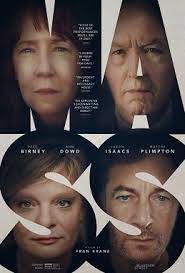 Mass was on the list of nominations for awards from the US-based International Association of Catholic Critics. It received excellent reviews but seems to have had limited distribution outside the United States, finally being chosen for screening at the Melbourne International Film Festival.
Mass was on the list of nominations for awards from the US-based International Association of Catholic Critics. It received excellent reviews but seems to have had limited distribution outside the United States, finally being chosen for screening at the Melbourne International Film Festival.
We need to understand the title, Mass, Catholic redemptive tones, forgiveness and atonement. Then it was pointed out, “Mass” murder. The story is of that all too frequent American occurrence, school, students and teachers, gun massacres.
The focus of the screenplay is quite confined but making the drama and intense dialogue (without any visual flashbacks) all the more powerful and disturbing. And, the setting for the meeting is a room adjacent to a church.
While there are a few incidental characters, those working at the church where the meeting is about to be held, the focus is strongly on the two sets of parents, with expert performances by Jason Isaacs (interesting casting of an Englishman in such an American role), Martha Plimpton as his wife. Very persuasive it is and Dowd as the mother of the shooter, contrasting with the rather reserved, heady manner and considerations of her husband, Reed Birney. Their performances are so powerful, relying on dialogue in close-up, that it would be interesting to see a stage version of Mass.
The audience is asked to spend time (and emotions) as the parents of the dead boys sit with the parents of the student shooter. Truth and Reconciliation is not achieved instantly and has been in progress before this meeting. The four parents have permission to vent their distress and grief, loss of their sons, the mystery of being the parents of the disturbed shooter being blamed by association. A tribute to writer and director, Fran Kranz) and cast, each with their dramatic outbursts, their quiet moments, the clash between mind and heart, and the final sentiment in so many of these stories: “I can’t forgive yet. Give me some time and I will try”.
- The title, religious? The meaning of the Christian Mass? The reference to mass murder?
- Middle American setting, filmed in Idaho, glimpses of the town, exteriors of the church, the fields on the fence with the ribbon, the interiors of the church, the rectory, the room for the meeting? The musical score?
- The introduction, Judy, housekeeper, sitting in the church, the shopping, Anthony and his work, keeping the house, the preparation for the Sunday liturgy, pages, the choir? The church and the student learning the piano?
- The coordinator, her arrival, the plan, booking, the room, rearranging the chairs, tea and coffee, conversation with Judy?
- The arrival of Jay and Gail, her hesitance, driving away, the return, going into the room? Tentative? The arrival of Linda and Richard, coming into the room, the chairs?
- The situation, Gail and Jay and their dead son, in the school? Age? Grief? Linda and Richard, their son, killing, the number of dead? Their experience of attack, issues of law, the interactions with Gail and Jay? The baggage each couple was bringing to the meeting? Yet their willingness to come?
- Grief of the parents of dead victims? The question of the responsibility of the parents of the killer? Gail and Jay and their probing of Richard and Linda on these issues, making demands that they speak? The effect on Richard, on Linda? The tentative opening, the exchange of photos, the gift of the flowers, Hayden and his jar for the snails, creating forest? The tension, willingness to speak? Willingness to listen?
- Jay, marriage to Gail, the many years, their daughter, growing up, University and dating? The loss of their son? The aftermath, court cases, media, legal issues? The toll on Jay, emotional, interactions with Gail? His importance scene, his grief, making demands on Richard, reacting to Richard’s objectivity? The question of blame? Anger? Subsiding? Listening to the stories? His own story about his son? Becoming more calm?
- Gail, tentative, practical, the flowers, the exchange of photos? Her presuppositions in condemning Richard and Linda as parents? The continual probing of their upbringing of their son? Her outbursts, having to move away from the table, Linda urging her to tell a story, the story of the football, mud and dirt, the best footballers? Her anger at the time, laughing? The importance of the story?
- Richard, businesslike, objective, not manifesting emotions? Audience prejudice against those who do not display emotions? The issue of blame, responsibility? His going over his son’s life, the various stages, the problems, facing them or not, bullying at school, his behaviour at home, the computer games? Facing the reality of what he had done? Issues of blame, responsibility? Moving his chair, bringing the tissue to Gail as she told the story?
- Linda, a focus for the audience, pleasant personality, the gift of the flowers, appreciating the photos, producing the jar with the pictures, snails? Her going over the situation, the explanation of her son growing up, the unexpected child, Richard and his devotion, love for the child, the problems, isolating, his room, the computer games? At school, better grades, yet the bullying? His friends? Her puzzle as to what she could have done? Handling the situation afterwards, letters attacking, letters of support? Her coming back and telling the story of her son’s anger, their shouting at each other, his wanting to hit her, and her regret that she should have let him do that, to vent his anger?
- The audience response to the dialogue, the power of words, powerful words, emotions, evoking stories, images, issues?
- Restorative justice, the nature of meetings, everybody able to speak, outbursts yet respect, the ultimate effect, purgative, cathartic?
- The aftermath, the couples calmer, the flowers in the box, Judy and her fussing, Anthony, his help? Richard wanting to leave, Linda following, her return in the story, embracing Gail? Her going quietly? Jay and Gail together, the flowers, the choir rehearsing for Sunday, listening to the music? The couple able to leave?
- The emotional effect of participating in such a session? And for the audience?
On the Count of Three
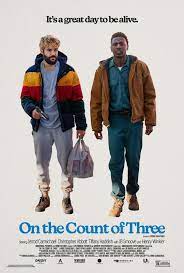
ON THE COUNT OF THREE
US, 2021, 86 minutes, Colour.
Jerrod Carmichael, Christopher Abbott, Tiffany had issued, Lavelle Crawford, J.B.Smooth, Henry Winkler.
Directed by Jerrod Carmichael.
The title has the dynamic touch about it. What will happen on the count of three? Taking off for a race? Or, weapons drawn? Face- off?
This is a brief film which had success at the Sundance Festival. And it has been directed by its star, Jerrod Carmichael, best known for comedy television and video films. And he plays the central character.
On the one hand, because it is about weapons drawn at the count of three, the themes are very serious. In fact, the initial focus is mutual suicide. However, there are many comic touches throughout, in the portrayal of the characters, some absurd situations, eccentric behaviour. Which makes the whole film a strange mixture of the disturbing and the entertaining.
In fact, it opens with the count of three situation, two men facing each other, pointing guns at each other – then a shot heard. Then flashbacks to explain the background of each of the characters.
And, they prove very interesting in themselves. Val, African-American, works in a garage, is depressed, rebuked for taking too much time for smokes, goes to the toilet, takes out his belt and attempts to hang himself. He is stopped by one of the coworkers. By contrast, Kevin, is in a mental institution, in therapy, abrasive to the therapist, yet apologising, a mixture of depression and courtesy, but who has attempted suicide. He and Val have been best friends for years – and Val comes to help him escape and to lead back to that count of three sequence.
Val is played by Jerrod Carmichael and Kevin by Christopher Abbott, who has appeared in a number of films with different character performances, his Kevin indicating how versatile he can be.
No secret that, at the beginning of the day, the count of three goes awry. The decision is then as to how they would spend their last day, leaving the suicide until the end of the day. They have a vehicle so this is a variation on a road movie: time spent at a diner where Kevin encounters someone from school days who bullied him, an attempt to visit a doctor from the past but who is absent from his surgery, the decision to go motorcycle riding as they did in the past, Val visiting is father after many years, a confrontation and a demand for the money that his father stole from him, a fight, Val wounded and the couple going to the store to get bandages, ignored by the man at the counter who is trying to get his accounts in order, Kevin threatening him with the gun, taking the supplies but leaving money for payment.
The money Val wanted and took from his father’s draw was for his wife whom he visits, who rejects him.
It is a highly dramatic sequence when Kevin goes back to find the doctor, a flashback to his childhood, Henry Winkler cameo as the seemingly sympathetic doctor until he asks a predatory question.
Ultimately, there is a police chase, the police converging, the two men talking on the edge of a cliff (and our wondering whether they will do a Thelma and Louise exit).
It doesn’t work out exactly as we might have anticipated which means that we will have to see the film to understand the two better and to discover their final decisions.
Brief but telling.
- Serious themes? Comic themes? Serious and comic treatment?
- The settings, the mental institution, the workplace, on the road, diners and meals, holidays at lakes, the motorcycle course, the doctor’s waiting room, the visit to the home and wife, the blend of real and surreal? The musical score, the songs, some of the lyrics echoing suicide?
- The title, the picture of Val and Kevin, the guns, counting, hearing the shot?
- Going back in time, Kevin in the institution, his mental state, suicide attempts, his insulting the therapist, apology, confused state, with the inmates?
- Val, at work, depressed, fellow workers and conversations, smoking time and the criticism, in the toilet, his belt, attempting to hang himself?
- Val coming to see Kevin, the discussions, the escape, driving away? Val and his proposal, mutual suicide, the guns, Kevin’s attitude, Val serious, the repetition of the scene, count of three, Kevin ducking, neither dying?
- The consequence, the decision to die at the end of the day, their last day and what they would decide to do? Kevin’s character, the flashbacks to his childhood, with the doctor, urging him on, heroic, then the abuse question? Age, depressed, his hair and dye? Cheerful, singing, sad? The contrast with the Val, morose, eventually visiting his wife, leaving the money, her refusal, pregnant? The effect on him?
- The various episodes during the day, the driving, singing, the diner, Kevin seeing the boy from school, the joking about the bullying at school, the man and his wife, baby, going for the break, and Kevin later taking the vehicle and going out, the gun, watching, going away? Going to the doctor’s waiting room, the cheerful assistant, his not being there? Going to the friend with the motorcycles, racing as they did in the past? The visit to Val’s father, his attitude, confrontation, asking for the money, the fight, Kevin hitting the father, Val taking the money?
- Val and his change of heart, wanting to leave, wanting to be a father? The wound from his father, going to the store, the assistant counting the money, Kevin putting the gun, taking the bag, paying for it?
- And then his visit to the doctor, the gun, the impact of the flashbacks, the doctor on the defensive, Kevin denouncing him, leaving the safety catch on, the doctor overpowering him, Val arriving and shooting the doctor?
- Driving quickly, the getaway, the pursuit by the police, the chase? Going to Donnie, the bikes, the police pursuit?
- The final talk, Val wanting to live, Kevin shooting himself?
- The aftermath, Val in prison, the visit to the wife and child, playing with them, the tracking shot tracking through the groups of prisoners?
- A blend of pessimism and optimism?
I Came By
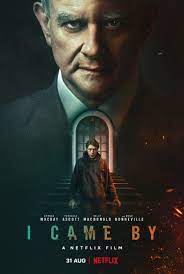
I CAME BY
UK, 2022, 110 minutes, Colour.
Hugh Bonneville, Kelly Macdonald, George MacKay, Percelle Ascott, Antonio Askeel, Anthony Calf.
Directed by Babak Anvari.
It is difficult to categorise this film. One might call it a London drama. On the other hand, it develops into something of a thriller. And, finally, it is a rather savage, even violent, drama about a sexual, sadistic predator.
The title is seen in rather large graffiti on walls in the houses of the rich, perpetrated by masked young men, played by George MacKay and Percelle Ascott. They have been friends for years. George MacKay is Toby, angry with his mother, social protest, ideological. Percelle Ascott is Jay, about to become a father and want to her break from these activities – especially since he is black and fears recriminations and harsh sentences in prison.
Kelly Macdonald has a strong role, time passing now, as she plays Toby’s mother. She is a therapist and is seen counselling a young man who has been suicidal, a session having repercussions on her own concern about her son who has disappeared. She goes in search for him, trying to get Jay’s help but his refusal, and not telling her the full truth about their graffiti days, which she then discovers. And she begins to stalk a major suspect.
This is one of those films where a central character disappears from the film halfway through. Toby has been stalking retired judge with a knighthood, Hector Blake, intruding into his house, and discovering an abducted man. When he returns to rescue the man, he is attacked – and disappears.
It is a surprise to find that Sir Hector Blake is played by Hugh Bonneville, in some ways reminding us of Downton Abbey but his character the complete opposite. The drama is intensified by Toby’s mother stalking him, going to the police, their examining the house, having him under suspicion, but finding no evidence.
There is a scene where he gets a massage at a gentlemen’s club, intrigued by an Iranian illegal worker, tries to seduce him, wreaks vengeance – and on Toby’s mother.
With Toby’s character’s protest and anti--social ideology, his attack on the homes of the wealthy and upper-class seem to seem have some justification by the character and behaviour of Hector Blake.
- Title? The graffiti? The two young men and their protests? The targets? The house of Hector Blake – and all those who came there (and did not pass by)?
- The London settings, the suburbs, the streets, ordinary homes, mansions, gentlemen’s clubs and massage, police precincts? The musical score?
- The introduction to Toby and Jay, masked, invading the homes, the graffiti, the signs, their age, protest, ideology, angers? Toby and his determination? Jay, becoming a father, breaking with Toby?
- Toby, his angers, absent father, resentment of his mother, behaviour at home, his room and décor, protest, arguments with his mother, protesting, wanting help from Jay? The scouting out of Blake’s home? Entering in, his search, the basement, the door, the peep hole, opening it, the abducted man? Returning, intending to rescue? Blake waiting for him, bludgeoning him? And the later scene of Blake and his grinding machine, everything into ash, the ashes in the toilet?
- Liz, her work as a therapist, the young man and his ambitions, pressure of his parents, attempted suicide? Her work, but upset the second visit? Her concern about Toby, searching, going to the police? Going to Jay, Jay not telling her the full truth? Her stalking Blake? Seeing the masseur? Outside the house, the masseur escaping and her giving him a lift? Her arguments with the police? The argument with Jay, seeing the USB stick, the images of the graffiti? Deciding to go in alone, the confrontation with Blake, her disappearance?
- Jay, background, protest, time in jail, interviews by the police, being black and expecting harsh treatment? His girlfriend, her being rejected by her parents? Pregnant? Time together, the friendship with Toby from young days, his sense of responsibility for his family, refusing to help Toby? Following up, the search? His wife and her reaction, her thesis and giving it to Blake, his putting it in the rubbish? His going to the house, the confrontation with Blake, finding the abducted man, the fight, overcoming Blake and tying him up, the graffiti, the police finding Blake?
- Blake, Hugh Bonneville, contrasting with Downton Abbey…? His background story, the pressure from his father, studying law, becoming a lawyer, becoming a judge, knighted? The portrait of his father prominent? His resignation? His public utterances about morality? His home, wealth? Suspicions? The photo? Homosexuality? The abducted man, keeping him locked? The confrontation with Toby, destroying weapons, clothes, bodies, the ashes in the toilet? Interviews by the police? His friend in high police places? Playing squash with him? His concern, security, returning home, his double standards? The massage, the attraction to the masseur, gay and fleeing Iran, inviting him, telling his story, spiking his drink, the man escaping, Blake pressurising him to come back, the threat about his legal immigration status, killing him?
- Liz, becoming desperate, over the months, stalking Blake, learning more about him, talking with the police, getting no answers? Blake going jogging, Liz deciding to enter, the search, the discovery, the fight, her being trapped? Her disappearance?
- The police, Toby’s call about the abducted man, searching the house, failing to find the lock room, later returns, finding Blake tied up, the police showing a certain delight in targeting Blake?
- The blend of drama, thriller, upper-class hypocrisy, lower caste protest, twisted homosexuality, bondage?
Reason, The
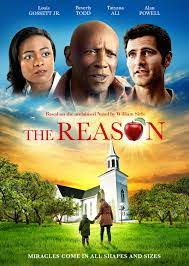
THE REASON
US, 2020, 83 minutes, Colour.
Louis Gossett Jr, Tatyana Ali, Beverly Todd, Kelly Carlson, Burgess Jenkins, Alan Powell, Charlie Ray Reid, Sara Antonio.
Directed by Randall Stevens.
The recurring phrase throughout this film, seen on posters and graffiti on walls is: Only Believe.
This is a very explicit faith film. It has been made for its target audience of believers, reinforcing their faith and God-commitment. It will not be persuasive for non-believers, especially for those who have some scorn for belief, critiques of God, dismissive of religion.
The film is strong in its expression of faith, of its conception of God. Louis Gossett Jr, in his 80s (Oscar winner for An Officer and a Gentleman) has appeared in quite a number of faith films over a 20 year period. Here he plays a blind pastor, managing small church. While it might be described as evangelical, there is no focus on the person of Jesus, Jesus as saviour, and minimal reference to Scriptures. The focus is on God and faith.
Central to the story is a stranger in town, Ken, played by Alan Powell. He approaches people, speaks sincerely to them, has an influence on their lives, is even able to do extraordinary things (reconstructing the huge cross outside the church which had been knocked down by lightning), understands people, is always present at crucial times.
But also atthe centre of the film is a young boy with leukaemia, a bright personality, a favourite with doctors and nurses at the hospital, especially the surgeon played by the enthusiastic and vivacious Tatyana Ali as well as the nurse with her personal problems but committed to the boy, using a Muppet-like puppet to urge him on, played by Kelly Carlson. There is a need for a bone marrow transplant.
Also at the hospital is another doctor who, it is revealed, is still grieving for the death of his daughter, and explicitly anti-God and anti-faith.
The mother approaches the father of the boy, whom she had encountered in a one night stand and not stayed with him. Ultimately, he is very sympathetic, and relates well with the boy.
The pastor slips and falls his kitchen and recovers his sight. There is story of a woman coming out of coma at the hospital. Only Believe. However, the film raises the question of accepting gifts from God with gratitude but also the question of what if present hopes are not fulfilled – the impact on the mother of the death of her son, and on the rest of the hospital staff.
There is some similarity in plot with Wish Man, also focusing on a boy with leukaemia and dying. Alan Powell, who plays the stranger, appears at the end of the film with a website advertisement for supporting children: Feedone.com It is The Reason. The screenplay is based on a book by author, William Sirls, who was written many faith-based books.
[An example of the anti-religious response, a compulsion to mock and condemn, is found in the IMDb entry:
Silly Movie
I'll take science, Alex. Yet another silly, poorly acted and poorly produced fairytale for grownups who simply cannot face the fact that there is no sky daddy.
You're cured. It was sky daddy. You're not cured. Sky daddy works in mysterious ways or had other plans.
You have to constantly brainwash and fool yourself. That's what "faith" is. Believing in silly nonsense and constantly talking yourself into it. Making you nice and malleable... And guillible. You'll believe anything. Opium for the masses! (Mehki_Girl, 15th November 2021).]
Murder is Easy/ 2009
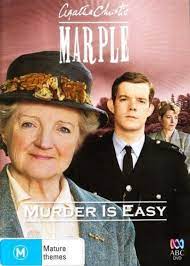
MURDER IS EASY
UK, 2009, 93 minutes, Colour.
Julia McKenzie, Benedict Cumberbatch, Steve Pemberton, Shirley Henderson, Sylvia Sims, Lindsey Marshall, James Lance, Tim Brooke-Taylor, Camilla Arfwedson, Hugo Speer, Anna Chancellor, David Haig, Margot Stilley, Jemma Redgrave, Russell Tovey, Stephen Churchett.
Directed by Hetty Macdonald.
The Miss Marple films for television have been very popular, from those of Joan Hickson to those of Geraldine McEwan to the final series with Julia McKenzie.
This Agatha Christie story had already been filmed in the 1980s with Helen Hayes, Bill Bixby and Olivia de Haviland. And it has been adapted for the stage.
As with the films, especially with Julia McKenzie and Geraldine McEwan, have very strong supporting cast, drawing on the range of top British actors. While Julia McKenzie is Miss Marple, and has been inserted into the original novel, she is helped in her detection by Benedict Cumberbatch, whose character was the main investigator in the novel. There is also the sympathetic young local police constable played by Russell Tovey.
Miss Marple becomes involved in the murders by accident, encountering Sylvia Sims on a train who tells the story of murders that have been easy, and then she herself is pushed down an escalator and dies. Miss Marple comes to the funeral, meets the former policeman who had served in Malaya, her presence at various functions – especially an early function when the local doctor, Tim Brooke Taylor, dies.
As with these television adaptations, they remain fairly close to the original novels but take various creative liberties with some of the characters, for instance here David Haig is the Conservative politician campaigning, supported by his sympathetic wife, Anna Chancellor.
Several more murders, a variety of explanations, theories about poisons… And the film takes account of more “adult” themes than Agatha Christie used, especially here, issues of abortion, an issue of incest.
Shirley Henderson plays the rather prim spinster of the village, playing the organ at the church. (And, by the end, she must be glad that this role is on her CV!).
- The popularity of Agatha Christie novels? Miss Marple inserted into this story?
- The British countryside, the village, the fields, the waterfall, the church, homes? 1955? Atmosphere? The Anglican church? Politics? The musical score?
- The situation in the village, the number of deaths, considered as accidents? The old grandmother, the Vicar, Lavinia, the doctor, the maid, Lydia? Suspects?
- The atmosphere of the town, the Vicar and his bees, his assistant and the ceremony, the people in the church? Honoria playing the organ, nodding to Lavinia? Lavinia and Scotland Yard, in the train, in London, the death on the escalator?
- Lavinia in the train, the conversation with Miss Marple, Miss Marple reading of her death, coming to the village, the encounter with Luke, ex-policeman, his past in Malaya? She and he doing the detecting? The young PC and his investigations?
- The gathering, the death of the doctor, his harsh attitude, the effect on his wife, her ditziness, the daughter, working in the library, in love with the local doctor? The major, his political ambitions, re-election, the Conservatives? Mr Abbott as his manager? Lydia and her devotion to her husband? Amy present, coughing, awkward? Henry, becoming the new Vicar? Honoria, her place in the community?
- The further deaths? Miss Marple and her listening, questions, helping with the political advertising? Bonding with Luke? With the young PC? Friendly with Lydia?
- The emerging of various stories of the past, the introduction of the abortion scene, the introduction of the incest theme, the murder of Honoria’s brother, mentally limited, alleged drinking and the major blaming himself, Abbott and his blackmailing the major to resign from parliament and Abbott to take his place? Abbott, his personality, the relationship with Amy, her pregnancy, the secret?
- Bridget Conway, from America, the brass rubbings, the attraction to Luke? Mysterious, Miss Marple suspecting her motives, the birthmark, Lydia seeing it? The discussions, Bridget and her identity, expecting the truth?
- The book on poisons, Henry returning it to the library? Miss Marple and her reading the book, discovering the different poisons?
- The gathering, the explanations of the past stories, the effect on everyone? Miss Marple and Honoria, getting her to speak, her explaining how she did each of the murders?
- And, at least, a happy romantic ending?
Nostalgia/ 2022
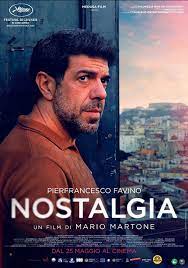
NOSTALGIA
Italy, 2022, 116 minutes, Colour.
Pierfrancesco Favino, Francesco Di Leva, Tommaso Ragno, Aurora Quattrocchi, Sofia Essaidi, Nello Mascia.
Directed by Mario Martone.
Nostalgia is a serious portrait and study, not without some light touches, of a man who has been away from where he grew up, Naples, for 40 years. As with so many men and women who roam, there is still somewhere they call home. And it creates a longing, perhaps reviving true and false memories, and nostalgia.
Felice, Pierfrancesco Favino, popular in many recent Italian films, is flying in from Cairo, wanting to see his ageing mother. But, there is a deeper motivation from the past – and there are many memory flashbacks throughout the film, indicated by a change of screen format, square – his growing up, rowdy, his friend, Oreste, with whom he shared happy biking days on the beach but whose actions led to a crisis, aged 15, and his being hurried out of the country by his uncle, returning only now.
There are some moving sequences as Felice rediscovers his mother, caring for her. But, at her funeral (and there have been some visual indications that he has embraced Islam with his wife in Cairo), he observes, detached, but he appreciates the words of the local parish priest, Don Luigi (Francesco De Leva). Felice had previously noticed him celebrating Mass with a crowd outside the cathedral, defying authorities and corruption, defying the widespread influence of the Camorra.
For audiences interested in portrayal of Catholic priests in more recent years, many critical and denunciatory, here is a very earnest priest, close to his parishioners, supporting young people (both in a gym and in creating an orchestra), welcomed into homes, but defying the local gangster culture and crime. He is sympathetic to Felice, acts almost as confessor and therapist.
And he warns Felics about his friend, Oreste, his leadership of local thugs and crime. Nevertheless, Felice wants to meet Oreste, to revisit the past, to understand it, to bond again with his one-time close friend.
There are two possible endings for a film about contemporary Naples and its crime problems – hope that the spirit of Don Luigi offers some optimism or regrets that the violence and vengeance of Oreste will prevail.
- The title? For Felice? His growing up, happiness, regrets, fears? 40 years away from Naples? His return, his mother, the effect of the city, the influence of Don Luigi, his quest to seek out Oreste?
- The emotional impact for an Italian audience? Identifying with Felice? For non-Italians, awareness of Naples, poverty, criminals, the Camorra? The role of the Catholic Church and priests?
- The portrait of Felice, on the plane, arriving in Naples, after 40 years, his age, experience? The hotel and settling in? In the streets, going to visit his mother, the reunion? Her moving from her flat? The broken phone, her eyes, friends reading his letters to her? His buying the bathroom soaps and sponges, bathing his mother, she bathing him as a boy, his bathing her as an adult? The bond between them? Talking, memories?
- The design of the flashbacks, the use of the square frame format? Felice as a boy, 15 years old, the motorbike, with Oreste, going to the beach, their friendship? Robbery, Oreste and the murder, Felice and his fear, escaping, his uncle and the confession, his uncle getting him out of the country to work in Lebanon, South Africa, Cairo? The long memory?
- His mother’s death, the funeral, the indication of his conversion to Islam? Thanking Don Luigi? The donation? The friendship, the visits, the discussions, the equivalent of confession?
- Don Luigi, corruption in Naples, his being forbidden to celebrate Mass outside the cathedral, his defying the authorities, the crowds, his urgent preaching? One with the people? The gym adjacent to the church, the young people and boxing (and his persuading Felice to let go himself and box)? The orchestra? The young people? The opening up of the catacombs and the hopes for tourists and the economy? The refugees from Africa, his getting Felice to translate the young man from Tunisia? Felice and his further involvement with the group, the visit to the catacombs, and his later hiding his house contract there?
- The glimpse of Oreste as an old man, his reputation as Badman, with the prostitute, his age, white hair? Memories of the past? His never being convicted for the murder? The danger with Felice’s return, and his strategy of blaming Felice for the murder and running away?
- The character of Don Luigi, the Neapolitan priest, full of energy, devout and celebrating Mass, funerals? Social concern, knowing families, visiting for meals and their welcome, even the drug dealing families, helping the son to borrow a violin? His inviting Feiice to visit with him?
- His advice to Felice, listening to the story, the equivalent of confession? Getting the young men to guard Felice? Felice and his buying the motorbike, Oreste and the men burning it, the graffiti on the wall for him to disappear?
- His making contact with Oreste’s guards, the rendezvous, the blindfold, the interview with Oreste, the frank talking, the memories, Felice and his need to contact Oreste, the possibility of friendship?
- The contact with his wife in Cairo, the phone calls, showing her the dancing on his phone, who work in the hospital, eager to go to Naples? Buying the ticket, the plan? Felice and his wanting to buy a house, discussion with the agents?
- Going for the walk, Oreste in his hood, going for the walk, the encounter, Oreste killing Felice?
- In the end of the film? Audience hopes that there will be some kind of redemption in Naples? But the reality of crime, corruption, hatred and violence?
Lost City of Melbourne, The
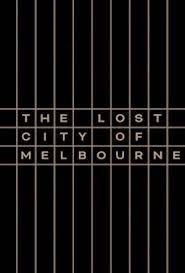
THE LOST CITY OF MELBOURNE
Australia, 2022, 83 minutes, Colour.
Directed by Gus Berger.
Back in the boom years of the 19th century, the aftermath of the gold rush, the development of business centres, the city was called “Marvellous Melbourne”. And its citizens built the city accordingly. But, as this film reminds us, so much of this great heyday period was demolished. And, there is also a sense of lamentation here that in the 1960s into the 1970s, demolition was the rage, down with the outmoded old, in with the glossy new, hotels, theatres, cinema out, glass skyscrapers in.
And, so many times displayed during this demolition, the notice is seen “Whelan the Wrecker is here” (and, one of the still standing Melbourne monuments, Barry Humphries, is seen back in the day walking and interviewing one of the Whelan family).
So, a cinema document of Melbourne, of great interest, of course, to Melbournites and to Victorians. (One hopes it will get a release in Sydney!).
And, of course, the impact will depend on the age of the audience. For younger cinemagoers, even the 1980s will have the touch of ancient history. But, for middle-aged audiences and, especially, older audiences, there will be mixes of regrets and nostalgia. (For instance, this reviewer first visited Melbourne from Sydney in 1951, living out in the countryside which is now suburban near Tullamarine, but able to go into the city to visit those picture palaces, Regent, Plaza, Athenaeum, Metro all in Collins Street the Metro in Bourke Street later the Palace… Memories and memories.)
With expert talking heads, we are given the history of Melbourne, commentary, but highly visual (and an extraordinary amount of credits at the end for each and every photo and film clip). We go back to the 1850s and move on over the next hundred years with some detail, buildings, mighty and prosperous ambitions, mansions, and mighty stone edifices. One of the amazing things from the photos and the clips is just how many people were in central Melbourne, crowds in Bourke Street and Collins Street in those days.
While a lot of the demolition is to be regretted, the commentators do point out some of the difficulties in maintaining the buildings, safety regulations and continued demands, improvements in technology, health regulations and hygiene… To the extent, we suppose, those buildings had to go. But, of course, not all of them. And, not all of them have gone – acknowledgement of the Windsor Hotel, the survival of the Rivoli, Astor, Balwyn cinemas. For moviegoers, especially those with long memories, much of the film is a history of the old cinemas, their place in the 20s and 30s, the rise of television, the disappearances.
In the overview of the history there is some aspects which might have received some or more attention, the acknowledgement of the churches in Collins Street is there but nothing of St Paul’s or St Patrick’s. Ultimately, the Exhibition Building is shown but there is very little on the move towards Federation and the fact of the first Australian parliament in Melbourne. But, all of us will have aspects we would like to have seen – then we’ll have to enjoy what is actually shown us.
Beach Bum, The
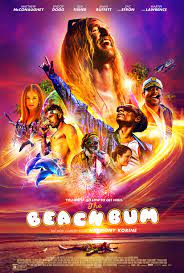
THE BEACH BUM
US, 2019, 93 minutes, Colour.
Matthew McConaughey, Snoop Dogg, Isla Fisher, Zac Efron, Martin Lawrence, Jonah Hill, Jimmy Buffett.
Directed by Harmony Korine.
Probably safe and wise to say beware all non-Slackers and non-Stoners. This is not your kind of film. (Corollary which, obviously, is that it is a film for Slackers and Stoners, practical or theoretical!)
The title is not deceptive. Matthew McConnaughey who, in the early 1990s, was able to pay a Slacker and Stoner, dazed and confused, now brings a certain experience and self-confidence to this kind of role, a talented writer in his way, but, dedicated to living in his past, egged on by friends and associates, assuming that life is fun, that drinking and drugs are a natural component of this lifestyle, (to say nothing of daggy clothes and hats).
Non-Stoners will be turned off almost immediately, being introduced to Moondog, and his friend, Lingerie, who keeps turning up throughout the film,, played by Snoop Dogg. The central activity is that Moondog’s daughter is getting married and he is being urged to be present (and, if possible, behave himself) at the wedding. He does need doesn’t.
However, if an audience continues watching, there is a plot development when the wife (Isla Fisher) unexpectedly dies, and stipulates in her will that her daughter is to get her inheritance but her husband will have to wait, behave, prove himself. Likely?
So, Moondog wanders, takes up with another slacker played by Zac Efron, encounters the captain of the boat, played by Martin Lawrence, Snoop Dogg turning up again, lots of talk, lots of idiotic behaviour, lots of drinking and drugs, an attempt at being creative and to revive his past, discussions with solicitors, and… Who knows?
The film was directed by one-time enfant terrible, Harmony Korine, Gung Ho, Julien donkey-boy, Mister Lonely.
